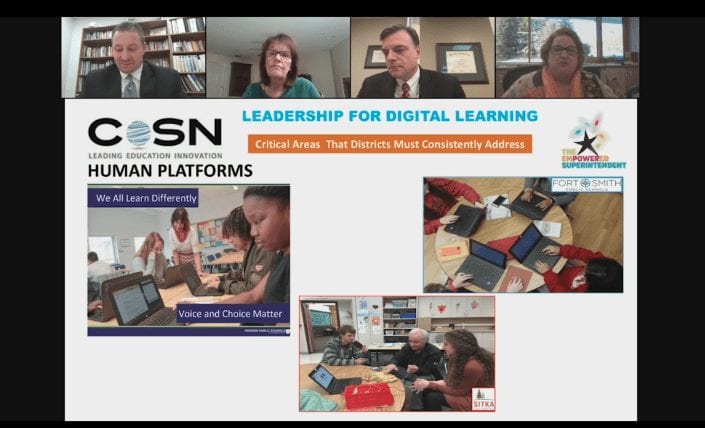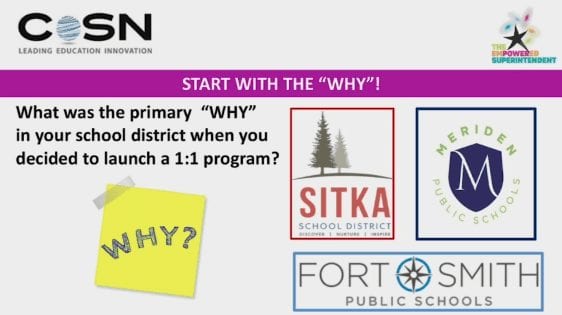Getting Whole Community Buy-in for 1:1 Technology Initiatives
Everyone has been to school and has their own image of what a classroom should look like. And depending on their background and experience, not everyone is supportive of tech-infused learning. Yet, 1:1 classrooms, BYOD, and tech-supported education are today’s reality. During the edWebinar, “Leading Digital Learning: Successful Strategies for 1:1 Implementations,” the presenters focused on how to get buy-in from within the school and across the community to improve chances for success and sustainability.
First, of course, superintendents and school leaders need to be clear on the why. When everyone in the school and community can explain it, they are more likely to support it. They are also more likely to back the initiative when the focus is on the learning and how to leverage tech to support it, rather than just on what device to get. The why, said the presenters, should always be about impacting students’ education. Another benefit of everyone understanding the why is because of potential hurdles. No matter how well-planned the initiative, there are bound to be slip ups and errors. Schools need a supportive team of educators (and students and parents) who will keep their attention on the end goal and not use the problems as an excuse to ditch the plan.
Next, once the mission is clear, leaders should work with the tech team and teachers to ensure that the technology will meet those goals. For instance, bring in the tech team from the beginning to talk about the school and district’s current infrastructure and what’s needed to implement the tech plan. Give them a voice to make sure that goals are achievable and let them offer their expertise. At the same time, understand when the school might need to use cloud services and outsource tech to get the best possible results.
Teachers, as well, should join the conversation from the start because the tech is meant to assist them with their students. And while more tech-savvy teachers may be involved with the initial discussions, don’t wait until the tech is all in place to start working with other staff. The presenters suggested tiered-professional development to bring varying skill levels up to task, and ongoing checkpoints to make sure no teacher is left behind. Moreover, keep checking on classrooms to make sure the tech is helping as envisioned rather than just becoming a projector screen or an afterthought.
The program and financial management of the tech plan has a human element as well. Leaders need to make sure that lawmakers and board members see the tech plan as a long-term, sustainable project and not just a one-off purchase of laptops. On the school side, the students need to become responsible stewards of the tech as well and should be involved in setting guidelines for responsible use.
Overall, communication is key at every step. Sometimes, the impetus for the tech will come from the students; sometimes, it’s from school leadership. Everyone in the community regardless of if they have a child in the school should understand how funding the technology has improved student learning. Emails, ads, and text alerts to parents were common among the presenters. In addition, they also invited parents to school to see the tech in action, and others have community walk-throughs that let a broader audience experience the tech-supported learning.
In fact, every message about the technology should be focused on the students and their needs. Consequently, leadership should talk to and survey students regularly to get their viewpoints on all aspects of the program. “We need to stop and listen, and there’s no one better to listen to than our students,” said Dr. Mark Benigni, Superintendent, Meriden Public Schools (CT). “I want to hear from them what’s going well, and what we could do differently.”
This broadcast was co-hosted by CoSN and edWeb.net and sponsored by ClassLink.
This article was modified and published by EdScoop and eSchool News.
About the Presenters
Mark D. Benigni, Ed.D. has been an educator for over 20 years and begins his 10th year as Superintendent of the Meriden Public Schools. Dr. Benigni served as a teacher, assistant principal, principal, and Mayor of the City of Meriden. In addition to leading the Meriden Public Schools to its highest academic scores in district history, Dr. Benigni has presented at national conferences, taught doctorate classes, and published a book and numerous articles. He was recognized as CoSN’s 2018 Empowered Superintendent, a 2015 Education Week Leaders to Learn From, and one of the United States Junior Chamber of Commerce’s Ten Outstanding Young Americans. The Meriden Public Schools has received awards from CoSN, the Learning Counsel, NSBA, Digital Promise, District Administration, and Edutopia. Dr. Benigni is currently the co-chair of the Connecticut Association of Urban Superintendents, as well as 2nd vice president of the Connecticut Association of Public School Superintendents.
Dr. Doug Brubaker serves as Superintendent of Fort Smith Public Schools, AR. Over a career spanning 24 years, he has served in a variety of leadership roles in school districts ranging in size from 7,000 to 60,000 students. As Superintendent of Fort Smith Public Schools, Dr. Brubaker launched the district’s Vision 2023 strategic planning initiative and worked with students, parents, educators, members of the community, and the FSPS Board of Education to identify, prioritize, and begin to address the district’s greatest needs. In May 2018, in part due to broad-based support for Vision 2023 goals, the district passed its first millage referendum in over 30 years. A dedicated funding stream for technology replacement has been a key accomplishment. Dr. Brubaker and his wife, Heather, have a daughter who attends school in the district. Dr. Brubaker has CoSN CETL certification and a Ph.D. in educational computing from the University of North Texas.
Dr. Mary Wegner is the superintendent in the Sitka School District in Sitka, Alaska. Her work focuses on transforming the learning landscape to be relevant for today’s students. Additionally, she is a strong advocate for digital-rich learning environments, as well as policies and funding that promote the value of public education to society. Mary is active in arts education organizations in Alaska and works to end homelessness in her home community.
About the Host
Ann McMullan is Project Director for CoSN’s Empowered Superintendents Initiative. Ann served as Executive Director, Educational Technology in the Klein Independent School District, near Houston, Texas until September 2013, when she and her family moved to Los Angeles, California. For 16 years Ann led the district team that provided professional development on technology and 21st century instructional strategies to 4,000 professional educators serving 50,000 students. Ann served as co-chair of Texas Education Technology Advisory Committee which developed the Texas Long Range Plan for Technology, 2006-2020. Today, Ann is based in Los Angeles working as a public speaker, writer, and education consultant focused on leadership and planning to meet the needs of today’s students. Ann serves on the Project Tomorrow advisory council and is a leadership consultant with Executive Service Corps of Southern California, serving non-profit associations. Ann co-authored Life Lessons in Leadership, a guide for leaders ages eight to 88.
Join the Community
Super-Connected is a free professional learning community on edWeb.net for school superintendents, district leadership, and aspiring district leaders.







Comments are closed.